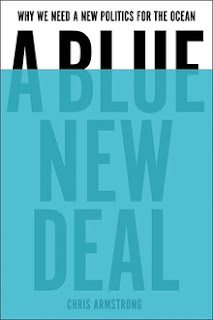 , and Why Global Justice Matters: Moral Progress in a Divided World.
, and Why Global Justice Matters: Moral Progress in a Divided World.
Armstrong applied the “Page 99 Test” to his new book, A Blue New Deal: Why We Need a New Politics for the Ocean, and reported the following:
Page 99 discusses the way in which existing forms of ocean governance are seriously underperforming, given the massive environmental challenges we face today. It notes that countries have embraced some seemingly ambitious goals for the protection of the ocean’s ecosystems. But we are not making sufficient progress towards meeting them. Meanwhile some environmental problems are falling between the cracks of a fragmented institutional system. Towards the bottom of the page, the book raises a second major issue, which asks who will benefit from the booming ocean economy: whether the ‘blue economy’ will be an arena of growing inequality, as seems to be the case, or whether we can turn back the tide of inequality.Visit Chris Armstrong's website.
This page is actually pretty representative of the message of the book as a whole. These two challenges – environmental destruction at sea, and growing inequality in the ocean economy – are actually the two reasons I argue we need a ‘Blue New Deal.’ A reader opening the book on page 99 would get a good sense of what I think is going wrong out there on the wider ocean. What they wouldn’t get is an insight into what I think we can do about it.
Later in the book, we get much more of a sense of how we could do things better. Page 99 falls in the middle of a pivotal chapter, where I set out some key principles of ocean justice. The following five chapters then go on to apply them in a series of areas. I discuss the plight of marine animals, and the ways in which we could better protect them; the exploitation and abuse that people working in the fishing industry can face; and the prospects for people whose countries might be submerged by sea level rise. I present a case for a Blue New Deal that would put equality and environmental protection centre-stage.
--Marshal Zeringue



